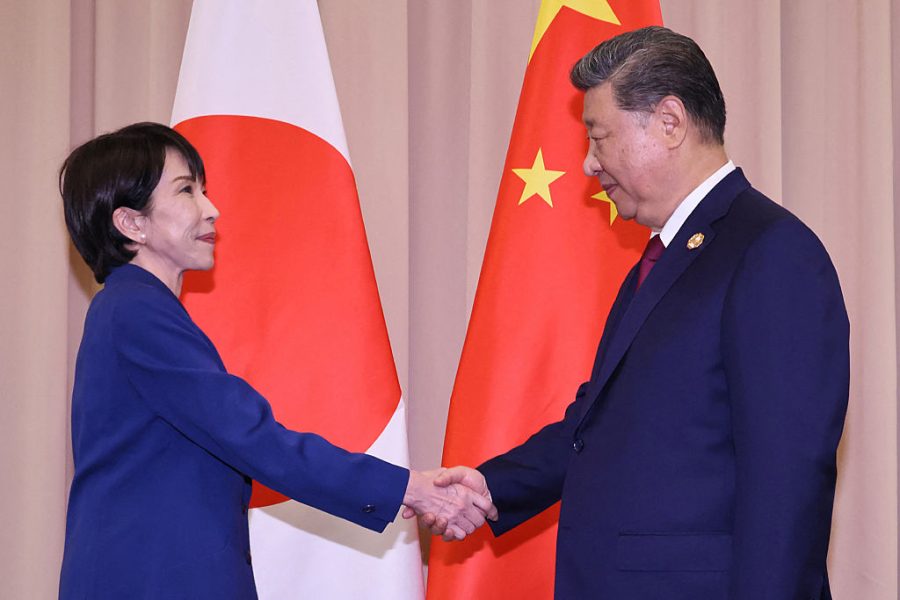It was only a matter of time before Japan’s Iron Lady would be targeted by China. Prime Minister Sanae Takaichi mentioned how Tokyo might resort to force were Beijing to take military action over Taiwan: ‘If there are battleships and the use of force, no matter how you think about it, it could constitute a survival-threatening situation,’ she said. In response, China’s consul-general in Osaka, Xue Jian, threatened, on Monday, to ‘cut off’ the Japanese prime minister’s ‘filthy neck…without a moment’s hesitation’.
Xue’s vitriolic online reaction, which he subsequently deleted from his X account, underscores how China’s wolf-warrior diplomacy has anything but abated. Yet, the incident highlights a more important reality for China and the West: firstly, that any action taken over Taiwan will have clear consequences for East Asia and beyond, and secondly, that Beijing would be naïve to expect these states to sit idly by.
The Chinese government is no stranger to speaking in idioms and metaphors. The vile tweet by its consul-general in Osaka, calling for the beheading of Takaichi, is a case in point. Nevertheless, Beijing’s reaction emphasized how reunification with Taiwan remains its utmost foreign policy priority. Just over two weeks ago, Xi Jinping responded to the election of Cheng Li-wun as the leader of Taiwan’s opposition Kuomintang (KMT) party by calling on the KMT to ‘advance national reunification’ and ‘boost common development’. One did not have to read between the lines to highlight what form of ‘national reunification’ Xi was referring to. Even despite the KMT’s stance of favouring closer ties between Taiwan and communist China, the Chinese president’s message was hardly congratulatory.
Tokyo would be obliged to defend Taiwan and, with it, the Western democratic world
Xue’s tweet was a more acerbic articulation of the Chinese Communist party’s mantra that reunification with China is anything but off the cards. Beijing has repeatedly expressed its plan to modernise its military by the deadlines of several upcoming anniversaries. Such modernisation cannot be divorced from possible action against Taiwan. By 2027, marking 100 years since the establishment of the People’s Liberation Army, Beijing wishes to ‘build a strong military’; by 2035, it hopes to ‘realise the modernisation of [its] national defence and armed forces’ to a level akin to that of the West; and by 2049, the centenary of communist China’s establishment by Mao Zedong, China hopes to ‘build a world-class military’.
The strategy Beijing will take to obtain its goal of reunification, however, remains unknown. Some may insist that to speak of a Taiwan ‘contingency’ reeks of ambiguity, but China has a range of options within its toolkit. Beijing could decide against a full-scale military invasion given the gargantuan economic and political cost, including to itself. Estimates of the cost of a cross-strait conflict on global trade range from the hardly paltry $2.6 trillion (£2 trillion) to $10 trillion (£7.6 trillion). In addition, Russia’s invasion of Ukraine may have taught China that being an occupying power does not come cheaply. Yet, even if China chose a military blockade using its naval and air forces – a strategy outlined by one of China’s leading defence universities – Beijing will have to balance the likelihood that doing so would allow it to achieve its goals in the face of global backlash, trade disruption, sanctions, and potential counteractions by its Western trade partners.
Two such trading partners are Japan and South Korea, both of which are staunch US military allies but core economic partners of China. Whether an invasion, blockade, or grey zone campaign involving disinformation tactics, Japanese Prime Minister Takaichi rightly stressed that, given the effects of any cross-strait conflict on Japan, Tokyo would be obliged to defend Taiwan and, with it, the Western democratic world. Not only does Japan import electronic and automotive parts from Taiwan, but Japan is also the fourth largest recipient of Taiwanese semiconductor exports. What is more, nearly 90 per cent of Japan and South Korea’s imports of crude oil pass through the South China Sea, which will form one of many chokepoints in any such scenario.
It could not be clearer that the Taiwan issue is a global problem. Over 90 per cent of the world’s most advanced semiconductors are produced in Taiwan, including for Apple. To describe the Taiwan issue as simply an issue between China and Taiwan, a claim uttered by Beijing and which South Korean president Lee Jae-myung has thankfully not repeated since his election, is to deny a geopolitical reality. Tokyo and Seoul may hesitate to respond – whether militarily with Washington or by sanctioning Beijing – in any such event, for fear of possible Chinese retaliation. Yet, failing to show resolve will mean a communist Chinese victory.
We in Great Britain will not be immune to any supply chain collapse given our own reliance on Taiwanese semiconductors. Making matters worse is that communist China remains our fourth largest trading partner. It is time to take the China threat seriously and bolster deterrence with our allies and partners. When negotiating the handover of Hong Kong, the then-Chinese president Deng Xiaoping told our own Iron Lady that he could ‘walk in and take the whole lot this afternoon’. Thatcher responded that whilst she could do little to stop him, ‘the eyes of the world would [then] know what China is like’. The rest, as they say, is history.
Nearly three decades after the Hong Kong handover, Japan’s Iron Lady was correct: a Chinese attack on Taiwan would threaten not just Japan’s existence but change global geopolitics as we know it. Xi could try and take Taiwan in an afternoon, but the million-dollar question is how – and whether Taiwan’s allies could successfully prevent it.







Comments